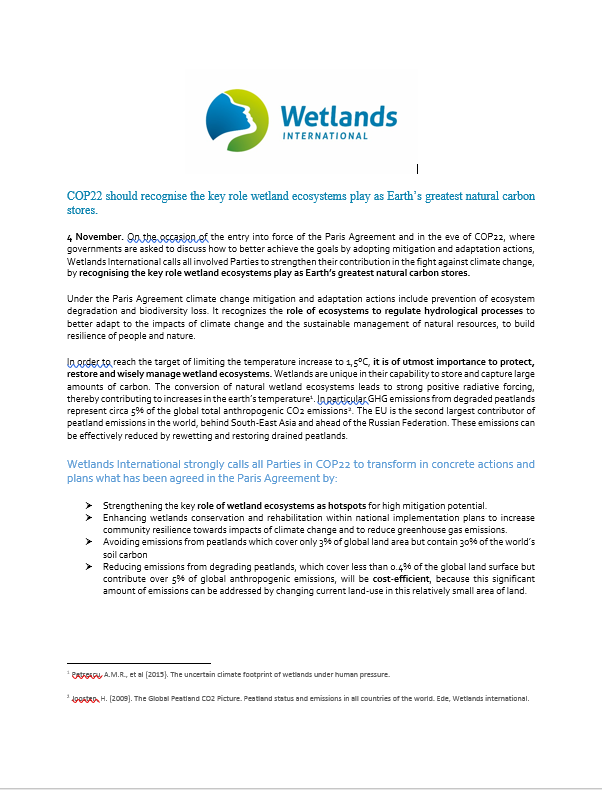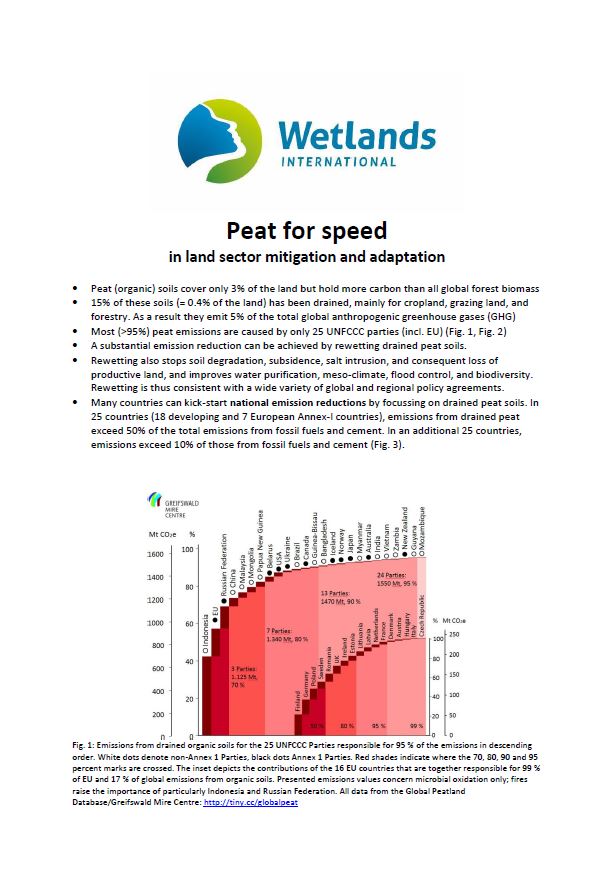
COP22 should recognise the key role wetland ecosystems play as Earth’s greatest natural carbon stores
Published on:
Wetlands International calls all involved Parties at UNFCCC COP22 to strengthen their contribution in the fight against climate change, by recognising the key role wetland ecosystems play as Earth’s greatest natural carbon stores.
Wetlands International strongly calls all Parties in COP22 to transform in concrete actions and plans what has been agreed in the Paris Agreement by:
- Strengthening the key role of wetland ecosystems as hotspots for high mitigation potential.
- Enhancing wetlands conservation and rehabilitation within national implementation plans to increase community resilience towards impacts of climate change and to reduce greenhouse gas emissions.
- Avoiding emissions from peatlands which cover only 3% of global land area but contain 30% of the world’s soil carbon
- Reducing emissions from degrading peatlands, which cover less than 0.4% of the global land surface but contribute over 5% of global anthropogenic emissions, will be cost-efficient, because this significant amount of emissions can be addressed by changing current land-use in this relatively small area of land.
- Stopping drainage of peatlands to prevent soil subsidence and eventual flooding and salt water intrusion. In mountain areas and riverine landscapes, healthy peatlands prevent soil erosion, downstream floods and desertification.
- Agreeing on an international mandatory accounting for peatlands and managed wetlands to achieve more ambitious emissions reductions targets. This would:
- Incentivise wetland restoration;
- Disincentivise drainage or damage of wetlands;
- Improve methodologies to measure and monitor emissions and carbon sequestration of wetlands;
- Develop a comprehensive inventory of wetlands/peatlands, both disturbed and undisturbed, and a system to monitor activities that would cause degradation and restoration;
- Facilitate the assessment of the potential for trading in carbon credits derived from reduced peatland emissions.
- Pushing for a quick phasing out of environmentally harmful subsidies in agricultural and forestry sectors, which instead of delivering positive contributions to climate change mitigation are subsidizing activities that enhance emissions through wetland degradation;
- Removal of regulations that block or hamper the introduction and up-scaling of environmentally sustainable land-uses in wetlands, including peatlands
- A full stop to the expansion of oil palm and other drainage-based production systems on peat, and planning for the responsible phasing-out of such production systems from peat lands and phasing in of sustainable alternatives.
- Including integrated water and wetland management in the review of Intended Nationally Determined Contributions (INDCs) strategies for building resilience to disasters and achieve a sustainable and secure world.
- Mainstreaming Ecosystem-based approach to Disaster Risk Reduction and Climate Change Adaptation measures in all NDCs and National Adaptation Planning (NAP)
- Encouraging and scaling-up investments in Eco-DRR/CCA and nature based solutions, including for protecting, restoring and sustainably managing wetlands.
- Scaling up low-tech, low-cost and flexible adaptation strategies like Building with Nature, to help people in developing countries cope with the effect of climate change.
- Emphasizing the nexus between land degradation, climate change and migration, and promoting strategies for water and wetlands management to support people livelihoods and increase the resilience of local communities.
- Put in place standards and appropriate certification mechanisms to ensure that climate mitigation and adaptation activities have a positive impact on nature and biodiversity.
Download the full document below and the policy brief on Peatlands


